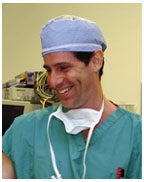
 October
22, 2003:
A
moment with...
October
22, 2003:
A
moment with...
Michael Kaplitt ’87
Michael Kaplitt ’87 made history in August when he performed the first gene-therapy surgery for Parkinson’s disease, using a virus to carry genetic information to the malfunctioning part of the brain. The surgery, done at New York Weill Cornell Medical Center, was the first in a series approved by the Food and Drug Administration to test the safety of the technique. Gene therapy is controversial, given a lack of good results and the 1999 death of a young patient undergoing treatment. But Kaplitt, who became interested in virology as a molecular biology major, has spent almost 15 years researching how gene therapy might be done safely and effectively. He spoke with Katherine Hobson ’94 for PAW days before performing a second operation.
What is the idea behind this new technique?
What works best now to treat Parkinson’s patients is deep brain stimulation [the implantation of electrodes in the deficient part of the brain]. We’re trying to change the function of the subthalamic nucleus, which is hyperactive in Parkinson’s. We decided to make our own GABA [a molecule released by nerve cells to dampen activity] to quiet that area down, and also quiet surrounding target areas. In theory, that would reestablish the normal pattern of activity.
Why is that better than deep brain stimulation, which you perform regularly?
Deep brain stimulation only affects the local area, but we’ve shown that gene therapy affects the surrounding areas as well. Also, people don’t like the idea of having electrodes and a battery inside them. There’s a 5 percent risk of infection, and you have to change the battery every four to six years – which is minor surgery, but still surgery.
What’s the new operation like?
It’s a lot like the operation for deep brain stimulation. The patient’s head is immobilized, and he is under local anesthesia. We visualize the brain by merging a C.T. scan with an M.R.I. scan on the computer in the operating room. We make a hole in the skull and probe it with electrodes to make sure we’re in the right place. Then we sedate the patient and infuse the virus for an hour and a half.
Who are the trial subjects?
Physiologically, they are the same kind of candidates as for deep brain stimulation. They have to be responding to medication, but increasingly resistant. That might mean they have erratic symptoms – they take their medicine at the same time, but sometimes symptoms are worse in the morning, sometimes at night. Many can’t plan anything. Some live in nursing homes — not because they’re sick all the time, but because they’re so afraid that they can’t live alone. They also can’t have any cognitive problems.
It’s hard to find patients who understand the risks and benefits. Some people want to do it to find a cure for Parkinson’s, and that’s not a good reason. We’re not going to find a cure. Some people say, “It’s an exciting thing that I want to be part of, and it may help people down the line even though for me, it may do nothing or may even hurt me.” That’s a good candidate.
Why do you think this is safe enough to try on humans?
We’re using a gutted and innocuous virus, and then we further gut it by removing its genetic material. Any bad effects from the virus probably would have shown up in a week. Bad effects from too much GABA probably would show up in about a month, the same time we’d be looking for benefits. We’ve also demonstrated primate safety in a monkey study with seven animals.
If gene therapy works for Parkinson’s, what diseases might be next?
There’s an attitude that gene therapy is so science fiction-y and so new that the only reason to use it is to cure something. Actually most of what we do in medicine is treatment, not cure. A bypass doesn’t cure heart disease. You can cure infection and that’s about it. To hold gene therapy to a standard higher than what medicine is held to is unfair. We want to take what we know about treatments and prove gene therapy can be done safely and effectively, because there are real things it could be used to do. Eventually, it might be used to treat epilepsy, multiple sclerosis, or diabetes.
Do you feel extra pressure when you do these controversial operations?
To some degree, I’m used to the pressure of treating people in
high-risk ways – they could bleed and die, they could have seizures,
they could have strokes. But there’s some additional pressure because
we’re doing something experimental when there are alternative treatments
available. I couldn’t sleep the night before the first operation.
But I get nervous before I operate on all my patients. I’ve learned
to live with it. ![]()
